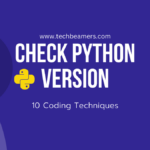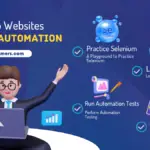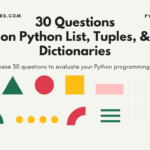Are you a programmer passionate about coding? If yes, then go through this tutorial; it will provide you with a clear roadmap and guidance for cracking coding interviews. Always remember, that even the best programmers need direction and a plan to achieve success. So, there’s no harm in listening, especially when it’s free. ?
Coding interviews, also known as technical interviews or programming interviews, are a common assessment method used by tech companies. Successfully cracking coding interviews is crucial for aspiring software professionals seeking employment in the tech industry. If you’re seeking advice on how to crack the coding interview, continue reading the journey of one of my colleagues who received offers from tech giants Alphabet, Apple, and Amazon.
Also Check: The Best 15 Leadership Interview Questions
Find Out the Code to Cracking the Coding Interview
Welcome to the world of coding interviews! This section is here to make things simpler as you gear up for the challenges that coding interviews bring. Whether you’re just starting out or looking to brush up on your skills, we’ve got your back. Let’s explore the essentials, tackle problems together, and pave the way for your success in coding interviews. Ready to dive in? Let’s start!
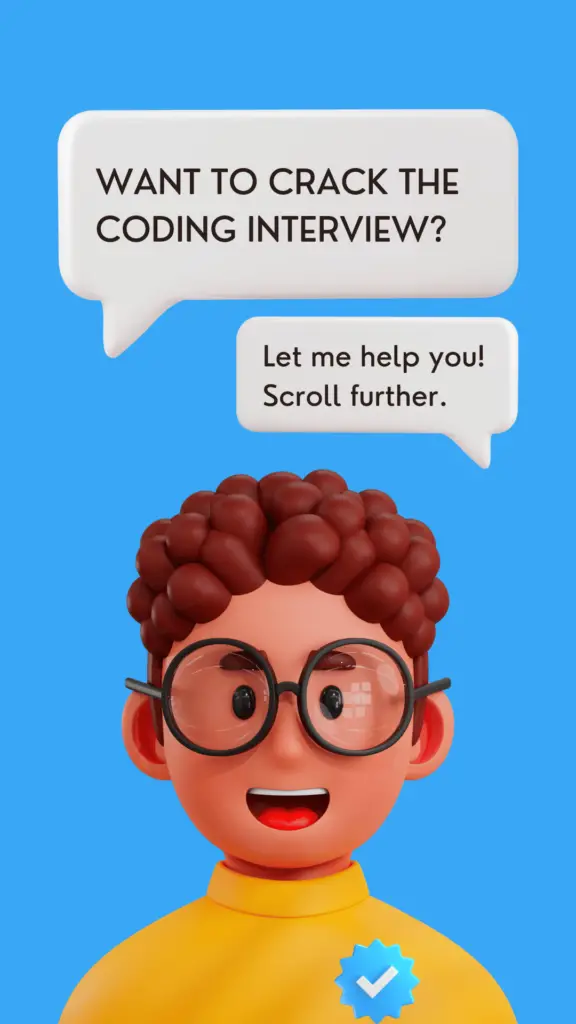
Chapter 1: The Journey Begins
My friend is a software engineer who has a passion for coding. Ever since she was in college, I’ve seen her fascinated by computers and how they work. She loved solving puzzles and figuring out how to make things work. So, it was no surprise that she decided to pursue a career in software engineering.
After graduating from college, she landed a job at a small startup. The work was good, but I knew that she eventually wanted to work for a big tech company. She had always dreamed of working for Google, Apple, or Amazon.
She knew that cracking the coding interviews at these companies would be no easy feat. But she was quite confident to succeed. So, she set out to do her research and learn everything she could about the interview process.
Check This: Tell Me About Yourself in An Interview
Chapter 2: Preparation is Key
She spent a month or so studying data structures and algorithms. She practiced solving coding problems on websites like LeetCode and HackerRank. Reading books wasn’t her type but she read articles to ace the coding interview.
During this time, she learned the most important thing that it’s not enough to just memorize algorithms. You need to be able to understand them and apply them to real-world problems. You also need to be able to think clearly and communicate your thoughts effectively.
Tip 1: Build a Solid Foundation You must realize the importance of having a strong foundation in data structures and algorithms. My friend focused on understanding concepts like arrays, linked lists, trees, and graphs thoroughly.
Check out a monthly roadmap that could help you gain the skills you need for cracking the coding interview.
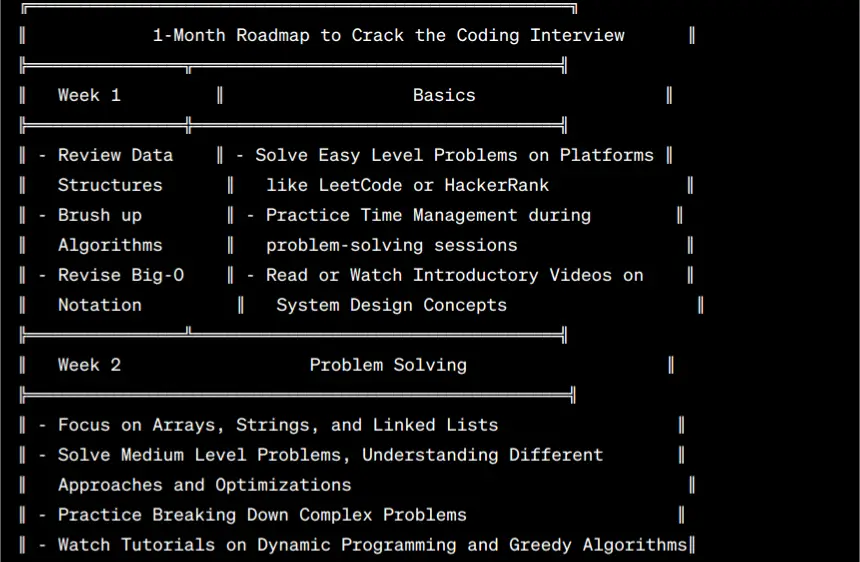
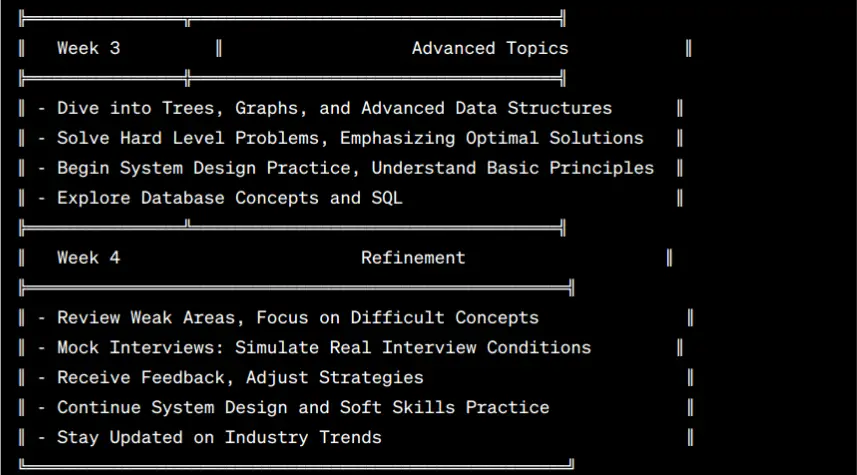
Tip 2: Practice, Practice, Practice To hone her coding skills, she dedicated a significant amount of time to practice. She solved problems of varying difficulty levels, ensuring she was comfortable with both common and uncommon patterns.
In addition to technical skills, she also worked on her soft skills. She practiced talking about her projects and experiences in a clear and concise way. Moreover, she also learned how to answer common interview questions, such as “Tell me about a time you faced a challenge and how you overcame it.”
Chapter 3: The Interviews
She applied for coding positions at Google, Apple, and Amazon. She felt fortunate enough to be invited to interview with all three companies. Each tech giant had its own unique interview process, but they had some commonalities. Here is a cool infographic to get you some tips on how to impress in a job interview.
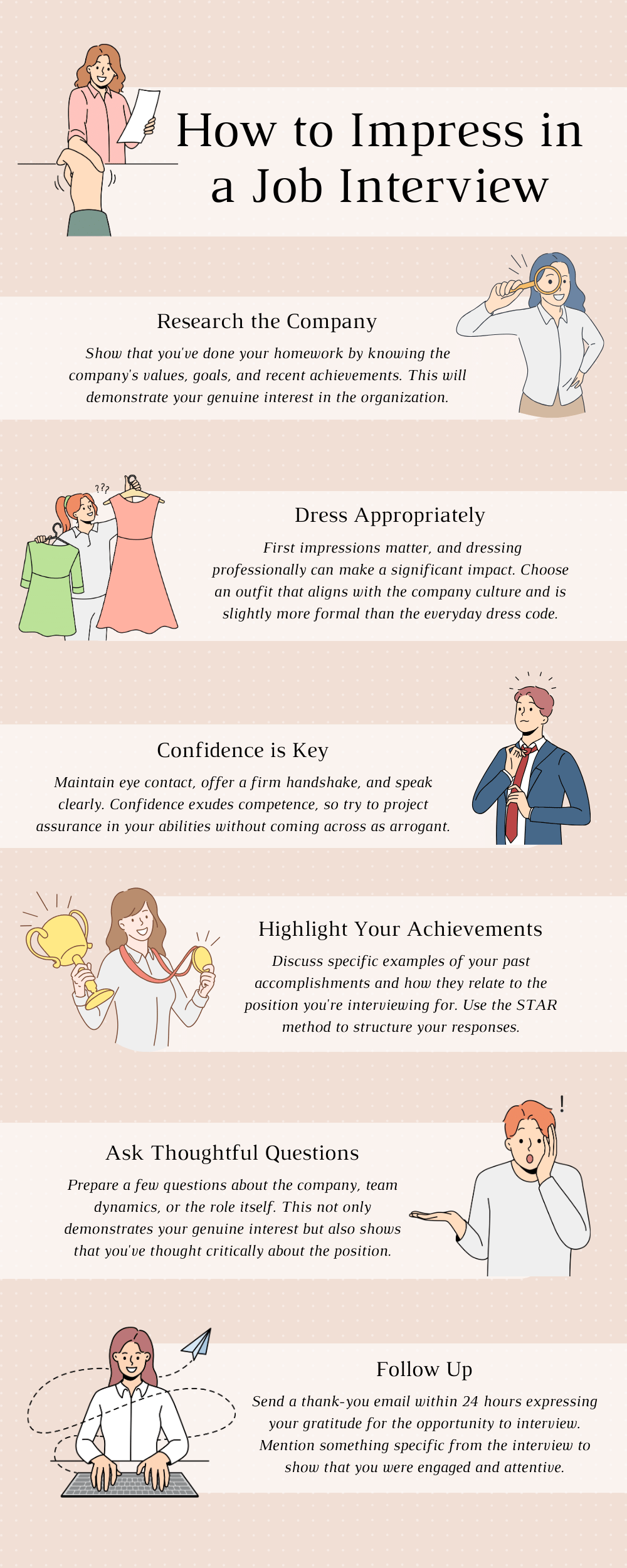
Alphabet (Google): The Algorithmic Playground
Her Google interview started with an algorithmic coding challenge. She was asked to solve a problem on a shared coding platform. The key was to write clean, efficient code and explain her thought process. The interviewer delved into her problem-solving approach, emphasizing both time and space complexity.
Tip 3: Communication is Key My friend learned that communication was crucial. She articulated her thoughts clearly, explaining her code step by step. This not only showcased her problem-solving skills but also her ability to collaborate.
Apple: A Blend of Technical and Behavioral
Apple’s interview process included both technical and behavioral assessments. My friend was asked about her previous experiences, projects, and how she handled challenges. The technical part involved coding challenges related to system design and problem-solving.
Tip 4: Master Behavioral Questions In addition to technical prowess, She recognized the importance of preparing for behavioral questions. She shared stories that demonstrated her teamwork, leadership, and problem-solving abilities.
Amazon: A Mix of Everything
Amazon’s interviews were a mix of technical problem-solving, system design, and code debugging. My friend found herself exploring a wide range of skills.
Tip 5: Be Adaptable My friend embraced adaptability. Each interview required a slightly different approach, and she was ready to switch between problem-solving, system design, and debugging seamlessly.
The coding interviews were tough, but she was ready. She was able to answer all of the questions and even got some compliments on her problem-solving skills.
After a few weeks, she received the news that she successfully cleared the interviews for all three companies. It was a phenomenal feeling for her! She had finally achieved her dream of working for a big tech company.
Chapter 4: Lessons Learned
She learned a lot from my experience preparing for and taking the coding interviews at Google, Apple, and Amazon. Here are some of the most important lessons learned:
- Preparation is key. The more you prepare, the more confident you will be during the interviews.
- Practice makes perfect. The more you practice solving coding problems, the better you will become at it.
- Don’t give up. The coding interviews are tough, but they are not impossible. If you keep practicing and never give up, you will eventually succeed.
Here is an infographic providing useful guidance on how to succeed in a job interview. Check it out.
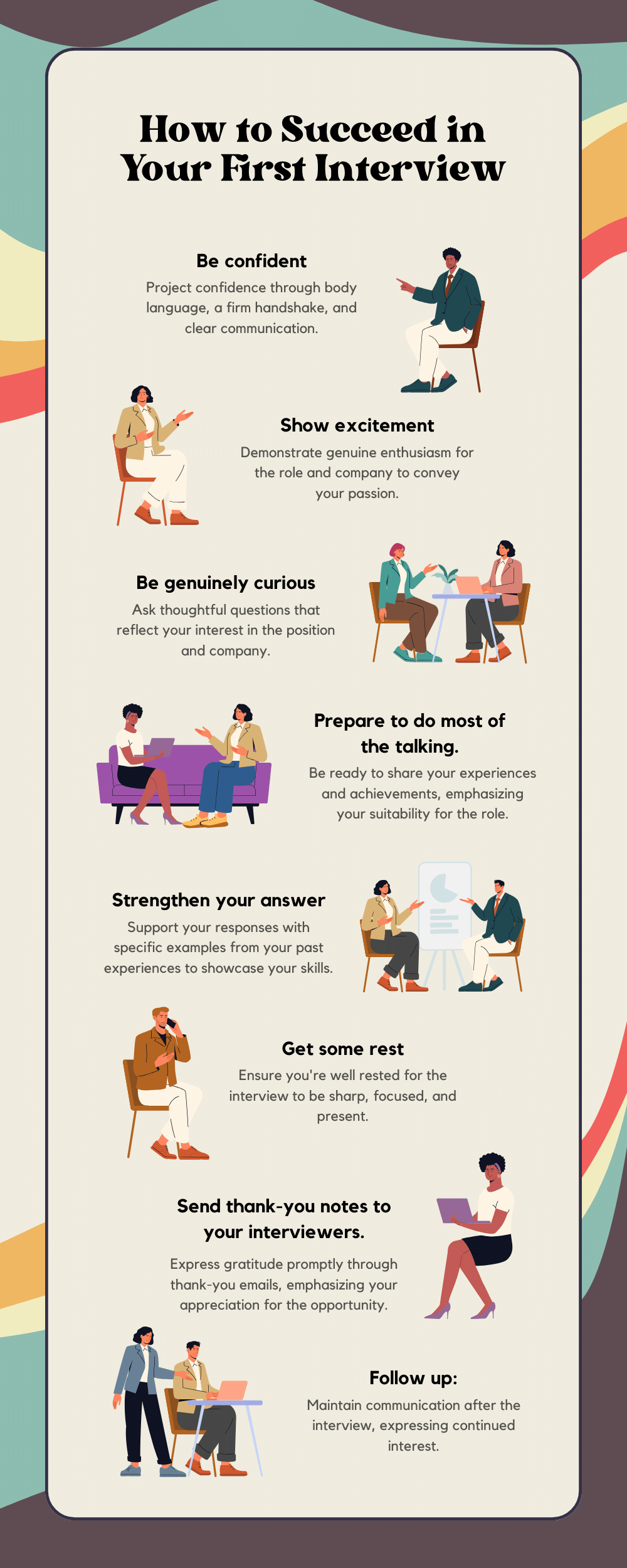
Chapter 5: Thumb Rules and Mantras for Cracking the Coding Interview
After weeks of rigorous preparation and multiple interviews, My friend received job offers from Google, Apple, and Amazon. She realized that her success wasn’t just about coding skills but a combination of technical expertise, communication, adaptability, and continuous improvement.
Mantra: The Four Cs – Code, Communicate, Collaborate, and Continue to Learn
Here are some thumb rules and mantras that were helpful for cracking the coding interview:
- Believe in yourself. You can do this!
- Stay calm and collected. The interviewer is trying to assess your problem-solving skills, not your ability to handle stress.
- Communicate your thoughts clearly. Even if you don’t know the answer to a question, explain your thought process to the interviewer.
- Don’t be afraid to ask for help. If you’re stuck, don’t be afraid to ask the interviewer for a hint.
- Practice, practice, practice. The more you practice, the better you will become at solving coding problems.
Here is a point-wise cheat sheet capturing the essence of my friend’s journey to cracking the coding interview. Take a printout or save it to your phone.
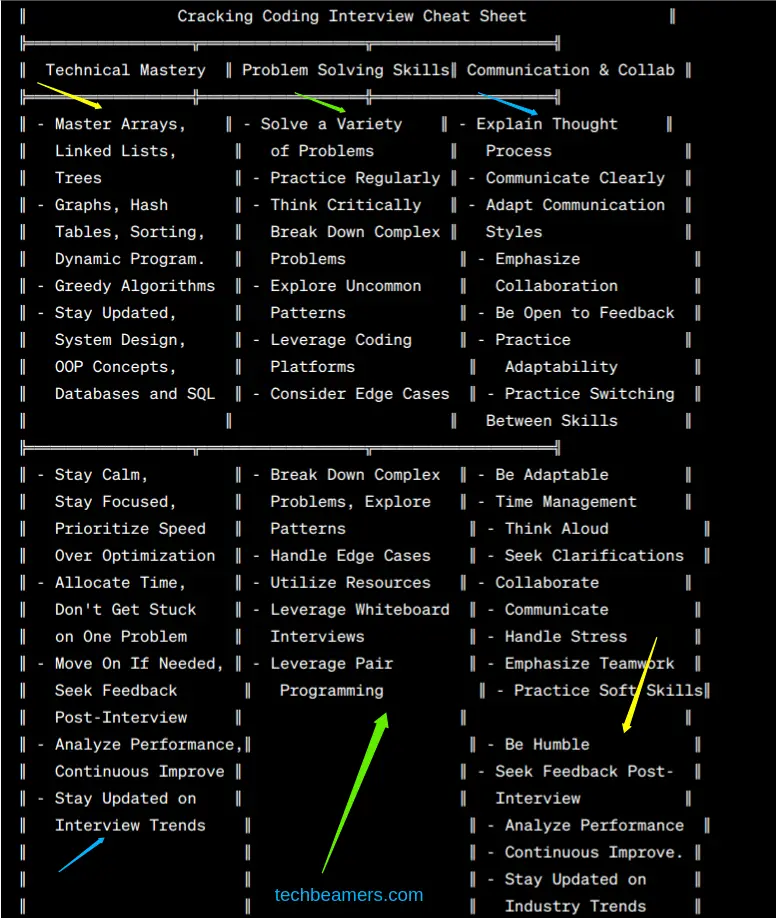
Chapter 6: Is There a Common Strategy to Tackle All the Companies or Take Specific Approaches?
There is a common strategy that you can use to tackle the coding interviews at all three companies. However, there are also some specific approaches that you can take for each company.
For example, Google’s coding interviews are known to be more difficult than Apple’s or Amazon’s. So, you may want to spend more time preparing for the Google interview.
Through her experiences, My friend was able to identify the following strategies that applied to all three tech giants:
Tip 6: Time Management She learned to manage her time effectively during interviews. She allocated time wisely, ensuring she didn’t spend too much on any single problem.
Tip 7: Don’t Panic, Think Aloud During challenging problems, She remembered not to panic. Instead, she thought aloud, explaining her approach and seeking feedback from the interviewer.
Tip 8: Continuous Improvement After each interview, She sought feedback and analyzed her performance. She identified areas for improvement and refined her strategy for the next one.
Watch Out Some of the Scientific Methods
Yes, there are several scientific methods that can help you crack coding interviews. These methods are based on principles from psychology, cognitive science, and computer science, and they can help you improve your problem-solving skills, communication skills, and overall approach to coding interviews.
Here are a few examples of scientific methods that can help you crack coding interviews:
a) Cognitive load theory
This theory suggests that there is a limited amount of information that our brains can process at once. When we are trying to learn or solve a problem, we can overload our cognitive systems if we try to do too much at once. To avoid cognitive overload, we can break down complex problems into smaller, more manageable steps. This approach can be particularly helpful when solving coding problems during an interview.
b) Metacognition
Metacognition is the ability to think about our own thinking. When we are metacognitive, we can become aware of our own strengths and weaknesses, and we can develop strategies for improving our performance. In the context of coding interviews, metacognition can help us identify areas where we need to improve our problem-solving skills or communication skills.
c) Growth mindset
A growth mindset is the belief that our abilities can be developed through effort and learning. People with a growth mindset are more likely to persevere in the face of challenges, and they are more likely to seek out opportunities to learn and grow. In the context of coding interviews, a growth mindset can help us overcome our fears of failure and motivate us to keep practicing and improving.
d) Active recall
Active recall is the process of retrieving information from memory without the aid of cues. It is a more effective way of learning than passive recall, which involves simply re-reading or re-watching material. Active recall can be used to improve your knowledge of coding concepts and algorithms, which will make you more prepared for coding interviews.
e) Spaced repetition
Spaced repetition is a way of learning where you review information more and more, but with increasing time in between. It’s a helpful method, especially for remembering words and their meanings. It can be used to review coding concepts and algorithms, which will help you keep them fresh in your mind for coding interviews.
In addition to these specific methods, there are a number of general scientific principles that can be applied to coding interviews. For example, the importance of getting enough sleep, eating a healthy diet, and exercising regularly has been well documented. These factors can all affect your cognitive performance and your ability to perform well in a high-pressure situation like a coding interview.
By applying scientific methods to your preparation, you can increase your chances of success in coding interviews and land your dream job in the tech industry.
7 Best Yogic Exercises for Cracking the Coding Interview
Yoga can help you do better in your coding interview. It’ll help you in improving your mental focus, clarity, and composure. Here are some simple practices you can try:
- Deep Breathing: Breathe in and out slowly to stay calm.
- Mindfulness Meditation: Take a moment to relax your mind and focus.
- Seated Poses: Sit comfortably to improve how you sit and work.
- Balancing Poses: Try standing on one leg to boost concentration.
- Child’s Pose: Relax by sitting back on your heels and reaching forward.
- Yoga Nidra: Take a short break with yogic sleep for a quick refresh.
- Sun Salutations: Warm up your body with a few stretches and breaths.
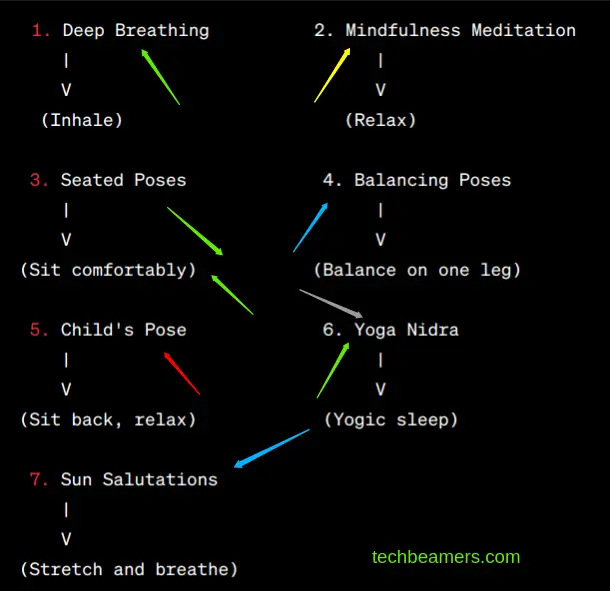
Remember, these are tools to help, not substitutes for focused coding practice. Find what works best for you!
7 Best Books for Cracking the Coding Interview
Reading books is helpful for cracking interviews because they provide valuable knowledge and tips. It’s like having a guide that prepares you with the information you need. Many books also include practice problems, acting as a training ground for coding challenges. Solving these problems is like practicing for the actual interview, making you more skilled and confident. Here are the 7 best books to boost your coding learning campaign.
1. “Cracking the Coding Interview” by Gayle Laakmann McDowell
Read this book if you want to feel confident and ready for coding interviews. It’s like a buddy guiding you through what to expect and how to shine.
2. “Elements of Programming Interviews” by Adnan Aziz, Tsung-Hsien Lee, and Amit Prakash
If you want to get better at coding interviews, read this book. It’s like a coach giving you exercises to build your skills, making you stronger for the big game.
3. “Algorithms” by Robert Sedgewick and Kevin Wayne
Read this book if you’re curious about the secrets of problem-solving. It’s like a fun adventure into the world of algorithms, showing you how to crack codes and solve puzzles.
4. “Programming Interviews Exposed” by John Mongan, Noah Kindler, and Eric Giguère
If you’re getting ready for interviews and want friendly advice, read this book. It’s like having a mentor giving you tips on how to tackle common questions and make a great impression.
5. “Crack the Coding Interview with Google” by Eric Gao
If Google’s interviews intrigue you, read this book. It’s like a guide taking you behind the scenes, helping you understand what Google looks for in candidates.
6. “The Pragmatic Programmer: Your Journey to Mastery” by Andrew Hunt and David Thomas
Read this book if you want to become a better programmer. It’s like having wise friends share practical advice, making your journey to mastery smoother and more enjoyable.
7. “LeetCode in Python: 50 Algorithms Coding Interview Questions” by Yang Hu
If you love hands-on learning and want to improve your coding skills, read this book. It’s like a friendly challenge, helping you practice and become more confident in solving coding problems.
Conclusion: Cracking the Coding Interview Howto Guide
Cracking the coding interviews at Google, Apple, and Amazon is a challenging but rewarding experience. If you are determined and willing to put in the hard work, you can achieve your dream of working for a big tech company.
I hope my friend’s story has inspired you to pursue your own coding dreams. Remember, anything is possible if you set your mind to it.
Thank you for reading!


